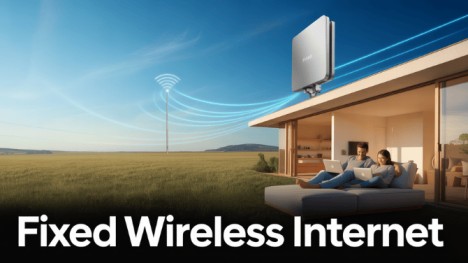


Discover what Fixed Wireless Internet is, how it works, and why it’s a reliable, high-speed solution for homes and businesses in rural and urban areas.
In today’s fast-paced digital world, staying connected is no longer a luxury. It’s a necessity. Whether for work, education, or entertainment, reliable internet access is essential. For many, traditional wired broadband like DSL or fiber isn’t always practical due to location, cost, or infrastructure issues. This is where fixed wireless internet comes in.
Fixed wireless internet is a type of broadband service that delivers high-speed internet without the need for physical cables to your home or office. It uses radio signals sent from a nearby tower to a receiver installed at your location. This technology fills the gap between traditional wired connections and mobile wireless services, offering a dependable alternative for areas with few broadband options.
It provides a dedicated connection to your location, unlike mobile internet, which is shared among multiple users. This leads to more stable speeds and lower latency, making it suitable for streaming, video calls, online gaming, and other activities that require high bandwidth.
At its core, fixed wireless internet relies on line-of-sight transmission between the service provider’s tower and the user’s receiver. Here’s a simplified breakdown:
Unlike mobile internet, which shares bandwidth with multiple users on the go, fixed wireless internet offers a dedicated connection for your location. This ensures more stable speeds and lower latency, making it suitable for video calls, streaming, gaming, and other high-bandwidth activities.
For RV users, campers, and remote workers, fixed wireless internet is an excellent solution for staying connected where traditional wired internet isn’t an option.
In an increasingly digital world, internet connectivity is about opportunity. For those in rural areas, travelers, and remote workers, fixed wireless internet opens doors to:
For businesses, reliable internet means better productivity, communication, and access to global markets. For families, it allows them to stay connected with loved ones, access online resources, and enjoy digital entertainment easily.
Several providers offer reliable fixed wireless internet across the USA, providing high-speed connectivity for rural and suburban users.
UbiFi: Opecializes in 4G LTE and 5G fixed wireless internet. This service is ideal for rural homes, farms, and RV users. UbiFi is known for low latency, nationwide coverage, and easy plug-and-play setup.
Rise Broadband: One of the largest fixed wireless providers in the U.S. It offers affordable plans with speeds up to 100 Mbps and no data caps in many areas.
Starlink: Operates a hybrid satellite and fixed wireless model. This service delivers high-speed internet even in very remote regions.
Nextlink Internet: Focuses on rural connectivity with scalable plans for both residential and business users.
AT&T Fixed Wireless: Provides stable connections for homes and small businesses in select rural areas with a wide network reach.
Each provider offers a unique combination of speed, reliability, and accessibility, helping to bridge the digital divide in underserved communities across America.
Fixed wireless internet offers speeds between 25 Mbps and over 100 Mbps, depending on the provider and location. This makes it suitable for streaming, video calls, and gaming without interruptions. It serves as a good alternative to traditional broadband for everyday use.
Yes, fixed wireless internet is generally reliable, as long as there is a clear line of sight between your receiver and the transmission tower. While severe weather may slightly affect performance, it usually provides consistent and stable connectivity.
No, one of the biggest advantages of fixed wireless internet is that it doesn’t need cables or fiber lines. You only need a receiver and router to get high-speed internet right at your location.
Absolutely! Fixed wireless is designed for rural and underserved areas where wired infrastructure is limited. It brings high-speed internet to homes, farms, and remote communities easily.
Unlike satellite internet, fixed wireless uses ground-based towers, which means lower latency and faster speeds. Satellite connections depend on orbiting satellites, which can cause delays and less reliable performance during bad weather.
The cost of fixed wireless internet usually ranges from $40 to $100 per month, depending on speed, data limits, and provider coverage. Many providers offer affordable plans without long-term contracts or hidden fees.
Fixed wireless internet is a powerful, flexible, and reliable option for those seeking high-speed internet without the limitations of wired connections. From rural homeowners to RV travelers and remote workers, it provides the connectivity needed to thrive in today’s digital landscape.
With providers like Ubifi, users can explore top fixed wireless internet options that combine speed, reliability, and affordability. Whether for streaming, work, or staying connected on the go, fixed wireless internet ensures you stay connected.
